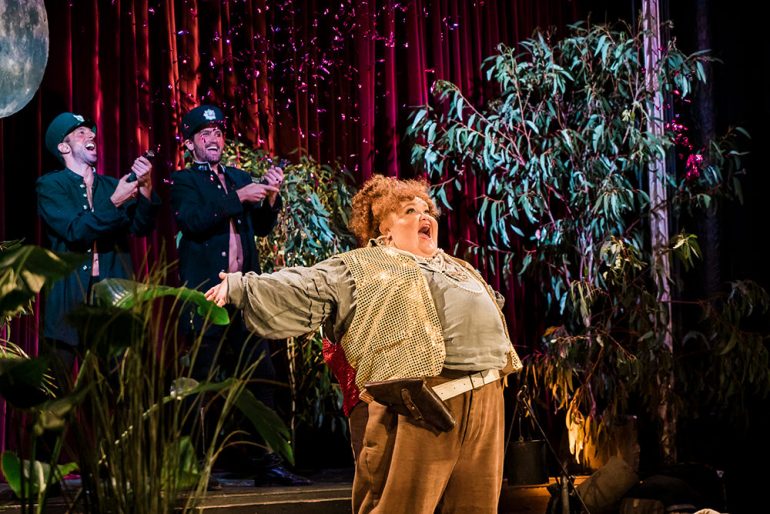Megan Wilding in ‘Sheilas’ (photo credit: Ash Berdebes).
Screen Australia met its overall Gender Matters target in the 2017-2018 financial year for the first time since the initiative was launched, with 51 per cent of all projects receiving production funding having at least half of the key creative roles occupied by women.
However, while there has been real improvement in female participation, the agency acknowledges there is still work to be done, particularly in the feature film sector.
Releasing the the second installment of tracking against its Gender Matters target, Joanna Werner, a Screen Australia board member who serves on the Gender Matters Taskforce said: “The entertainment industry is cyclical. You cannot plan for who will have a great idea and when. So whilst we saw a noticeable upswing in titles where women occupy at least half of key creative roles getting production funding in 2017/18, we’re already seeing that trend soften in our most recent funding rounds.
“Although it’s good to see we have hit our Gender Matters target early, it remains to be seen if the trend will hold. Coupled with the fact industry-wide data clearly shows areas of chronic under-utilisation of female talent remain, I would interpret today’s Gender Matters tracking data as a sign we are on the right track – not by any means at the end of the track.”
The percentage of female directors working in feature film (16 per cent) has not improved since the previous industry-wide data set was released by Screen Australia in 2015 covering the period July 1970 to June 2014.
However feature film is a smaller sector compared to TV drama in terms of the volume of content being produced, so there are fewer opportunities for creatives to work in feature films.
Screen Australia’s Drama Report showed that in 2016/17 $321 million was spent to make 457 hours of Australian TV drama. In the same period, $284 million was invested on 41 Australian features.
The agency also issued an update on successful and unsuccessful applications across development and production, which showed 57 per cent were for projects where women occupy at least half of the key creative roles.
Some 55 per cent of all approved applications were for projects where women occupy at least half of the key creative roles.
Werner added: “We’re very aware that television projects are much more likely to include female creatives than feature film, so our top line application numbers need to be read with the understanding that whilst female participation is increasing industry-wide, it is uneven.
“Whist we have seen steady improvement in the film figures over the last three financial years, women are still significantly under-represented in key roles, so our focus is to see much more advancement in this area.
“To that end, our new development programs will undoubtedly assist a wider group of creators to be able to workshop their projects, which will not only bring new voices into the market but give concepts the time and resources to incubate.”
In July 2016, $3.7 million was distributed to fund the development of 45 female-driven stories (Brilliant Stories) and 13 female-driven businesses (Brilliant Careers).
Three alumni of Brilliant Stories have already proceeded to production, with online comedy Sheilas from Hannah and Eliza Reilly launching later this month (sheilas.tv) and Rachel Griffiths’ Ride Like a Girl in post-production.
Last month Natalie Erika James’ feature Relic received production funding and has just finished shooting in Victoria.
Sophie Hyde and Rebecca Summerton utilised the funds to shepherd a large slate into fruition via their Closer Productions, including offering work opportunities to producers Bettina Hamilton, Katrina Lucas and Christine Williams.
Summerton said: “Support through Screen Australia’s Gender Matters program has affirmed Closer’s focus on the voices and careers of women. It has given us the financial capacity to employ three emerging female producers who have all gained significant experience and credits during their time at Closer. The funding has supported several mentorships for emerging female filmmakers and the development and financing of Closer’s female led projects F*!#king Adelaide (ABC), Animals (feature), Kids (feature documentary) and The Hunt (SBS).
“These four productions are all created, produced and directed by women. Three have female writers and all have women characters at the centre of their stories. We are proud of these outcomes and the support of Gender Matters has been integral to these achievements.”
Hyde added: “It’s heartening to see the industry focus shift towards valuing and therefore seeking and supporting voices that may not previously have been heard. As we have seen so vividly in statistics and industrial conversation, these unheard voices include women. There are large portions of the industry internationally who are driving at and supporting this shift toward valuing ‘who’ is telling the story, but in the most part the progress is slow – the numbers haven’t shifted a huge amount despite some visible and vocal initiatives and a growing audience hunger for female driven stories. We are hopeful for continued positive change over time as the ripple effect of vital initiatives like Gender Matters flow out wider.”
The Australian Directors’ Guild used its Brilliant Careers funding to place female directors into TV dramas, including Jane Eakin (Street Smart), Darlene Johnson (Home and Away) and Lisa Matthews (Doctor Doctor) as shadow directors.
Lucy Gaffy was hosted by Essential Media and Entertainment as the shadow director on episode seven of the second series of Doctor Doctor. The pay-off: She was hired to direct four episodes of series three.
For more info go here


